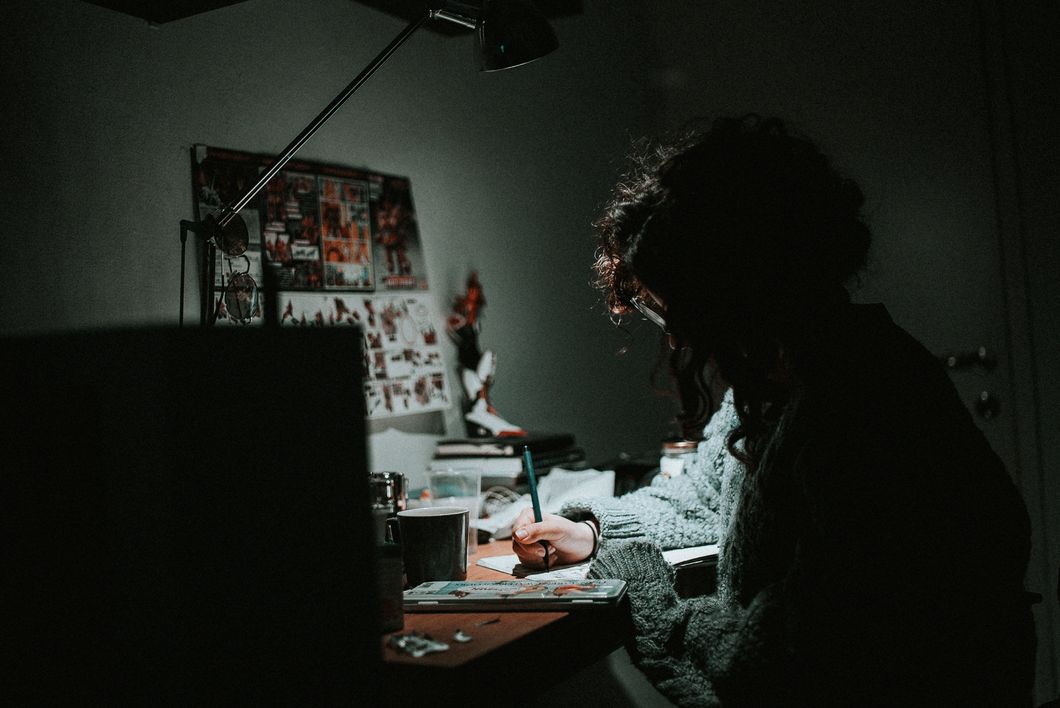Majoring in creative writing taught me that a good writer knows their characters ridiculously well, even if everything they know isn't shown during the story.
Because even if the name of their first pet or their favorite ice cream flavor or their junior prom experience doesn't naturally come up, the writer knows all of those details, and it seeps out. The characters are no longer two-dimensional; they become people with their own hopes and fears and experiences and passions.
You can tell the difference between a writer who doesn't know their characters that well and one who knows nearly everything about them.
The author who discovers just enough about the characters to write the piece produces something more bland and stilted. I once had a friend review a pilot script I wrote and tell me, "The dialogue sounds like it could be said by anyone." And they were right. I didn't know my characters well enough for them to have unique quirks or reasons for saying what they did; they were just there to accomplish the plot.
And that's the problem. Writing can be either genre or literary.
Genre writing means what you think. It's a specific genre--like adventure, romance, sports drama, superhero origin story, etc.--and it has conventions to follow.
Have you ever noticed that most rom-coms are the same? Girl meets boy. Girl and boy get along. Something happens so that girl loses boy. Girl and boy realize they truly love each other, and they declare their love in a major way. It's the basic plot for any rom-com. Try this formula on "How To Lose A Guy In 10 Days," "Set It Up," "The Wedding Singer," or anything by Jane Austen. There can be slight deviations or creative twists to each genre's conventions, but typically, they're all similar.
Even "Napoleon Dynamite", a film lauded for its bizarreness, follows specific genre conventions.
There's nothing inherently wrong with genre writing. As consumers, we eat them up. It's why the Marvel Cinematic Universe is doing so well right now. Unfortunately, genre writing can be predictable, and at its worst, it can be plot over characters.
That's where literary writing comes in.
Literary fiction is driven by the characters, and while genre will still be incorporated, it may deviate from the conventions because the characters will decide the plot rather than the plot deciding what the characters will do or say.
If you already know that you'll be writing a rom-com where the two leads end up together, then the characters will be forced to be compatible, break up, and eventually find each other again. It leaves no room for the characters to do what is natural for them.
Literary writing is about discovering your characters rather than creating them.
All of this to say that whether you're writing literary or genre (and most of my professors would hope there'd be a major literary component--or at least some breaking of genre conventions), you must know your characters if you want to write a good story.
These are the ways that have helped me the most.
1. Answer character questionnaires.
A simple Google search will yield some good results, but I've found a few to be particularly helpful. Uta Hagen's 9 Questions covers the basics: who and where the character is, what they want, the obstacles, their relationships, etc. Though there's only nine questions, each question covers a multitude of facets. For example, the "Who Am I?" question prompts you to provide not only your character's name and age, but their "address, relatives, likes, dislikes, hobbies, career, description of physical traits, opinions, beliefs, religion, education, origins, enemies, loved ones, sociological influences, etc."
The Gotham Character Questionnaire asks basics--such as your character's secrets, what makes them laugh out loud, and birthmarks--but it also asks the unconventional ones, such as "What is in your characters refrigerator right now? On her bedroom floor? On her nightstand? In her garbage can?"
On the same website, the Marcel Proust Character Questionnaire is formatted as you interviewing your character. It asks about their favorite occupation, overused words or phrases, most treasured possession, etc.
You can start a Google Doc for each character and fill out these questionnaires. If you can't answer all of them yet, that's okay. The answers will come; you just have to be patient. Discovering characters takes time.
2. Create aesthetic boards on Pinterest.
I do this every time I write anything as it gives me insight I wouldn't have known otherwise. If you don't know what an aesthetic board is, it's basically photos of physical features, food, drinks, activities, or quotes that have to do with your character.
I tend to keep my own aesthetic boards secret just because I'm an obscurely private person when it comes to certain things, but I've created aesthetic boards for shows and movies I watch (such as "Stranger Things" or the "Star Wars" universe or the "Narnia" series) and characters within those shows and movies (i.e. Steve Harrington, George Knightley from "Emma," and Karen Page from the Marvel Netflix show "Daredevil").
To start your own aesthetic boards, simply search on Pinterest for characters your characters are similar to (since we all know we can unashamedly draw inspiration from what we see around us). For a character I'm working on now, I'll search for Pinterest boards for Amy Santiago, Rory Gilmore, and Karen Page, knowing she had some similarities to them. You can also search for pins using certain keywords and "aes" following it.
The more you delve into the aesthetic board world, the more you'll see random photos and immediately connect them to a character, discovering something about them you didn't know before. A photo of a dude eating cereal showed up on my feed, and I immediately knew that was perfect for another character I'm writing, even though I hadn't thought of that before.
Aesthetic boards can also be a good starting point, before the daunting task of filling out questionnaires.
3. Create character mixes.
Whether you use Spotify, Apple Music, or 8tracks, you can create a playlist of songs that remind you of your character and listen to it as you write. You can do this for the writing project as a whole or for specific characters, but the latter really gives you a depth of understanding for your characters.
The songs can be songs that are true to their experiences (i.e. "Daddy Issues" by the Neighborhood for characters whose dads are dead, gone, or problematic) or songs they enjoy listening to. The two may overlap since we as humans are drawn to songs about our experiences, and your characters will be no different.
This mix will give you insight into how they feel, what they've gone through, and what kind of music they like. (Does your character hate country? Are Carly Rae Jepsen bops their guilty pleasure? Do they think twenty one pilots is overrated?)
Just as with your aesthetic board, you can search Google or Tumblr for fanmixes or playlists for characters yours are similar to.
4. Practice writing them in situations you won't even use in your project.
You can grab a prompt from Google, Pinterest, or Tumblr and use your characters to answer it, even if it's post-apocalyptic. It can be something outlandish that you won't even use in your final project. You could write about the death of a character, even if you're writing a lighthearted comedy and the character isn't going to die, just so you can get to know how other characters would react and further understand their relationships.
You could also write texting conversations between characters, getting to know not only the nature of their relationship, but how each character types, whether or not they use gifs or memes, etc.
You may discover aspects of your character by putting them in situations outside your genre that you wouldn't have otherwise.
5. Create Google Docs detailing everything.
Compile your answers to the questionnaires and what you discovered about them on your own and through the aesthetic boards, character mixes, and practice writing.
You can create headers about their personality, family, friends, romantic relationships, education, hobbies, childhood, etc., detailing everything you know under each one. Though the headers aren't necessary, a place to compile everything you know about them is.
As you practice these strategies, you'll be able to create compelling characters with complexity and depth that go beyond genre conventions. Getting to discover your characters is half the fun, so enjoy it!











 Photo by
Photo by 








